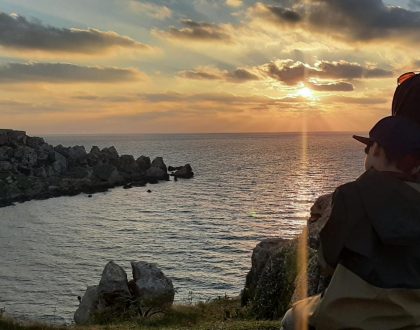What’s the ultimate purpose of seeking knowledge?

by Abu Shama
Why is it necessary to seek knowledge? What do we gain from it?
There are many hadiths showing the virtues and merits of knowledge. In the following hadith reported by Abu Hurayrah (may Allah be pleased with him), the Messenger of Allah (peace be on him) said:
‘Whoever follows a path searching for knowledge, Allah will ease for him onto a path towards paradise.’
[Muslim]
So this shows us the great excellence of the students of knowledge. Seeking knowledge is a path, a way towards His pleasure, a way to Allah, a way to a better life and a road to salvation from the Fire of Hell and heading towards happiness and the eternal delights in the Gardens of Paradise.
Every Muslim should have their goal set on Paradise, Allah says:
‘And surely Paradise – it is the goal.’ And ‘Indeed the next abode – it is truly the life!’
[al-Naziat: 79:41] and [al-Ankabut:29:64].
Paradise can only be attained through seeking Allah’s pleasure, and the way to gain His pleasure is to follow the Messenger of Allah (peace be on him), and to follow the Messenger of Allah (peace be on him) requires one to seek knowledge on the message he was entrusted with by Allah to mankind.
The Messenger of Allah (peace be on him) said:
‘Seeking knowledge is compulsory upon every Muslim’
[Ibn Majah]
Seeking knowledge is a duty on every Muslim, man or woman who has testified to worship of the One true God.
Seeking knowledge of Islam is one of the best ways of being obedient to Allah and thus one of the best ways to get closer to Him. It is an act of worship which improves and facilitates all other acts of worship.
The first duty of any Muslim is to get to know his religion through the right sources. This is because in Islam, knowledge comes before action. A person should know that Allah has made it obligatory upon him to worship his Lord. And this worship cannot be attained except through sound knowledge, verily, how can one worship Allah without knowing the proper etiquette in worshipping Him?
‘Knowledge has priority over preaching and action.’
[Bukhari]
It is not befitting for a Muslim to remain in ignorance. Thus, his search for knowledge is so that he may eradicate ignorance from himself and so that he may worship his Lord in the manner in which Allah has commanded and not in the manner in which his desires deem appropriate. Umar Ibn Abdul Aziz, one of the righteous caliphs, said:
‘Whoever acts without sound knowledge, he ends up destroying more than what he is building.’
Every person should acquire as much knowledge of fiqh as he needs to ensure that his worship and daily dealings are correct, and he should ensure that he has a sound grasp of the basic principles of his religion.
So it comes as no surprise to see Muslims thirsting for knowledge, devoting themselves to its pursuit. Muslims of all times and places have understood the importance of seeking beneficial knowledge, and the positive effects this has on their own characters, families and societies. So they seek knowledge enthusiastically, hoping to learn that which may benefit them in this world and the next.
The Qur’an and Sunnah are directed at men and women equally, and that they are both obliged to seek the kinds of knowledge that have been made obligatory for individuals and communities (fard `ayn and fard kifayah) to pursue them.
One should seek knowledge to serve Allah. And often the means of serving Allah is through serving the people. So he is required to seek knowledge, whether it is ‘religious’ or ‘secular’ that leads to the progression of this ummah, benefits himself and the servants of Allah is deemed to beneficial and good. It may be fard Kifaya upon the community to have people with specific knowledge and expertise that the community is in need of. As long as these needs are not fulfilled, the community as a whole will be responsible to answering to Allah for the failure to do so.
The Muslim who understands that seeking knowledge is a duty required of his faith can never stop nourishing his mind with knowledge, no matter how busy he may be with work or taking care of his family. He steals the odd moment, here and there, to sit down with a good book, or a useful magazine, so that he widens his knowledge. He uses all his spare time to broaden his horizons with some useful academic, social or literary knowledge, thus increasing his intellectual abilities.
This is a series compiled following lectures on ‘The Manners and Etiquette of the Teacher and the Students’. The course was based on a book written by Shaykh al-Islam, Badr al-Din Ibn Jama’ah and conveyed to us by our Shaykh Haytham Tamim.
Qadi al-Qudat, Shaykh al-Islam, Badr al-Din Ibn Jama’ah was born in 639 AH (1241 AD). Originally from Syria and later moved to Egypt. He was educated at Hama, achieved excellence in religious studies and jurisprudence, and became a leading promoter of the Shafi’i Fiqh. Eventually, he attained the high status of Shaykh al-Islam and held the high position of Chief Justice. Imam al-Dhahabi has observed that Qadi Ibn Jama’ah was well versed both in prose and poetry, and had left abundant notes on Fiqh, Hadith, Usul al-Fiqh, and Tarikh(History). He commanded respect and influence, and had a large number of students and followers. He died at Cairo in the year 733 A.H. (1332 A.D.), aged 94, and was buried by the side of the great Imam Shafi’i.
His book on the subject of Adab al-Alim wal-Mutaalim
It was in the year 672 AH (1273 AD) that Ibn Jama’ah completed this book as a guide for both students and teachers to help improve quality of their academic life and work.
Suggested Books:
Ibn Jama’ah – Etitquettes of Seeking Knowledge
Abd Al Barr – Jami’ Bayan Al Ilm
Al Khateeb Al Baghdadi – Al Jami’ li Akhlaq Al Rawi
Recommended Posts

Can playing with children be an act of worship?
February 21, 2023

Whomsoever Allah wishes good for…
February 08, 2022

Must have books in our home library
July 07, 2020

